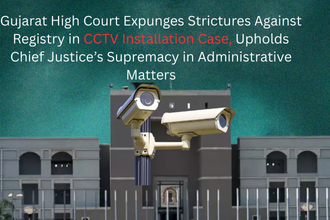In a significant ruling on arbitration and limitation laws, the Himachal Pradesh High Court has held that Section 5 of the Limitation Act, 1963 does not apply to petitions filed under Section 34 of the Arbitration and Conciliation Act, 1996 (Arbitration Act). This decision highlights the stringent timelines involved in challenging arbitral awards and reinforces the limited scope for delay condonation.
The Case at Hand: National Highway Authority of India vs. Jagroop Singh & Ors.
The dispute arose from an arbitral award passed on January 3, 2022, by an arbitrator, which was challenged by the appellant, the National Highway Authority of India (NHAI), under Section 34 of the Arbitration Act. The challenge was based on the argument that the award was unjust, leading to the filing of a petition to set it aside. However, the petition was filed well beyond the three-month statutory limit prescribed under Section 34(3) of the Arbitration Act.
This case eventually landed in the Himachal Pradesh High Court after the District Judge dismissed the petition on June 13, 2024, ruling that it had been filed beyond the prescribed period. This decision led the NHAI to challenge the dismissal before the High Court, seeking a remedy under Section 37 of the Arbitration Act, though the appeal was also filed with a delay of 258 days.
The Court’s Key Findings:
Justice Jyotsna Rewal Dua, presiding over the matter, meticulously examined the application of limitation rules in the context of arbitration. According to the court’s observations:
- Statutory Time Limits:
Under Section 34(3) of the Arbitration Act, an application for setting aside an arbitral award must be made within three months from the date of receipt of the award. In this case, the award was received by the NHAI on August 20, 2022, which meant that the three-month window to challenge the award began from that date, expiring on November 22, 2022. The extension allowed for a further 30 days for a valid reason was also passed on December 22, 2022. However, the petition was filed on January 19, 2023, beyond the permissible period, resulting in a delay of 33 days. - No Applicability of Section 5 of the Limitation Act:
The core issue in the case was whether the delay in filing the petition could be condoned under Section 5 of the Limitation Act, 1963. Section 5 allows courts to extend the time for filing appeals or petitions if the delay is sufficiently justified. However, the Himachal Pradesh High Court ruled that Section 5 of the Limitation Act does not apply to petitions filed under Section 34 of the Arbitration Act. The specific provisions of the Arbitration Act, particularly Section 34(3), impose strict limits on the time within which challenges to arbitral awards can be filed. The court emphasized that the legislature had intentionally created a rigid framework for such challenges, which does not allow for the relaxation of time limits. - Interpretation of the Phrase “But Not Thereafter”:
One of the pivotal elements of the court’s analysis was the interpretation of the phrase “but not thereafter” in the proviso to Section 34(3) of the Arbitration Act. This phrase bars the filing of an application beyond the prescribed period, including the 30-day extension. The court referred to the Supreme Court’s ruling in My Preferred Transformation & Hospitality Pvt. Ltd. & Anr. vs. M/s. Faridabad Implements Pvt. Ltd (2025), which had previously addressed this issue and held that any delay beyond 120 days (including the original three months and the extended 30 days) cannot be condoned. The strict application of this provision underlines the importance of adhering to timelines in arbitration proceedings. - Dismissal of the Appeal:
In light of the above, the court concluded that the District Judge had correctly dismissed the petition as it was filed beyond the statutory period allowed for challenging the arbitral award. The NHAI also failed to provide a valid explanation for the delay in filing the appeal under Section 37 of the Arbitration Act. Consequently, both the application for condoning the delay and the appeal were dismissed.
Implications of the Judgment:
This ruling serves as a stern reminder for parties involved in arbitration proceedings about the importance of adhering to the prescribed time limits. The Himachal Pradesh High Court has unequivocally affirmed that the timelines under Section 34 of the Arbitration Act are rigid and must be followed strictly, with no scope for flexibility or delay beyond the permissible period.
The decision is significant for several reasons:
- Precedent on Limitation:
The judgment reinforces the legal principle that the Limitation Act’s provisions, specifically Section 5, do not apply in the context of challenging arbitral awards. This means that parties must be extremely diligent in filing challenges within the prescribed time frame and cannot rely on general provisions for extending the period. - Efficiency of Arbitration Process:
The strict enforcement of time limits under the Arbitration Act is aimed at promoting the efficiency and finality of arbitration. It ensures that arbitral awards are not endlessly delayed by petitions for annulment or challenges, which could undermine the efficacy of the arbitration process. - Guidance for Future Cases:
The court’s interpretation of Section 34(3) and the phrase “but not thereafter” will likely influence future cases concerning the timeliness of challenges to arbitral awards. Legal practitioners and businesses engaging in arbitration will need to pay closer attention to deadlines to avoid costly delays and complications.
Conclusion:
The Himachal Pradesh High Court’s ruling in the case of National Highway Authority of India vs. Jagroop Singh & Ors. serves as a critical reminder that parties challenging arbitral awards must act swiftly and within the time limits prescribed by law. The court’s decision underscores the need for adherence to timelines and the non-applicability of Section 5 of the Limitation Act to petitions under Section 34 of the Arbitration Act, reinforcing the finality and efficiency of the arbitration process.


